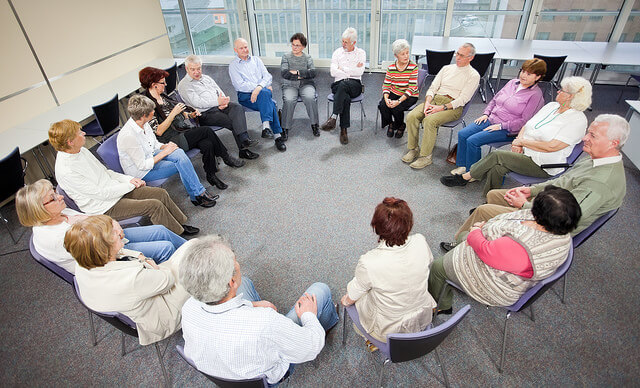Webinars in Patient Safety and Quality Improvement
The Armstrong Institute periodically hosts free educational webinars to support the efforts of health care organizations everywhere to improve the safety, quality and value of care.
Past Webinars
Patient and Family-Centered Care and Research Partnerships during COVID-19 Webinar
This webinar covered the findings of the Recovering Patients Informing Research About COVID-19 (REPAIR COVID-19) project. The project engaged a diverse group of adults who have had COVID-19 and their caregivers in a series of conversations to learn about their experiences, questions and concerns; their recommendations regarding how to improve care for patients with COVID-19; and what they think are important topics for COVID-19 research studies.
“Introducing the Roadmap to Peer Support”

Presenter
Hanan Aboumatar, M.D., M.P.H.
Associate Professor of Medicine, Johns Hopkins School of Medicine
Director, Armstrong Institute Center for Engagement and Patient-Centered Innovations
Panelists
Kate Farinholt, J.D.
Executive Director, National Alliance on Mental Illness Maryland
Joan Forte, M.B.A., B.S.N.
Health Care Consultant and Former Administrative Director, Patient and Community Engagement, Stanford Healthcare and Clinics
Lillie Shockney, R.N., B.S., M.A.S.
University Distinguished Service Professor of Breast Cancer; Administrative Director, Johns Hopkins Breast Center, and Director, Johns Hopkins Cancer Survivorship Programs
Christine Sweeney, L.I.C.S.W.
Program Manager, The Parent Connection, Beth Israel Deaconess Medical Center
Summary
Peer support programs can have a profound impact on individuals coping with health conditions. Drawing on the experiences of peers — other people who have "been there" — these programs offer practical advice for managing health problems, help link individuals to services in the community, and provide emotional support, connection, confidence and hope.
Yet, peer support is not available for a broad range of health conditions. Through a grant from the Patient-Centered Outcomes Research Institute, an Armstrong Institute-led team has developed a guide for anyone seeking to create and sustain a peer support program. Drawing on collaborative work with seven peer support programs and interviews with 43 of their key informants, the Roadmap to Peer Support is now freely available.
“Taming the Opioid Epidemic: The Role of Naloxone Prescribing”

Presenters
Suzanne Amato Nesbit
Pharm.D., B.C.P.S., C.P.E., F.C.C.P., Clinical Pharmacy Specialist – Pain Management, The Johns Hopkins Hospital
Juliana Zschoche
Pharm.D., B.C.P.S., Clinical Pharmacy Specialist – Emergency Medicine, The Johns Hopkins Hospital
Summary
The statistics on opioid overdoses in the United States are staggering: Since 1999, overdose deaths from opioids have nearly quadrupled. In 2015, more than 33,000 deaths involved opioids. Often, by the time that paramedics arrive, it is too late to save a life.
As this epidemic rages, more health care organizations are taking steps to prescribe naloxone (Narcan®) to high-risk patients to reverse opioid overdoses. In this webinar, clinical pharmacy specialists Suzanne Nesbit and Juliana Zschoche:
- Review methods for identifying patients at high overdose risk
- Provide recommendations for writing and filling of naloxone prescriptions
- Discuss challenges to developing and implementing naloxone prescribing across a health system
- Compare strategies for incorporating overdose education and naloxone programs into different care settings
Their presentation draws on their experiences of creating and implementing a naloxone-prescribing policy across the Johns Hopkins Health System’s hospitals, ambulatory settings and outpatient pharmacies.
“Diagnosis as a Team Sport”

Presenter
David Newman-Toker, M.D., Ph.D.
Director, Armstrong Institute Center for Diagnostic Excellence
Summary
Physicians are tasked with identifying the patient’s medical condition, but they are not the only ones who can ensure a correct diagnosis. Nurses, physical therapists, physician assistants and family members can also help prevent incorrect or missed diagnoses. In a one-hour webinar, Dr. Newman-Toker discusses the benefits of diagnostic teamwork, how to involve other health care professionals and patients as critical members of the diagnostic team, and the barriers to diagnostic teamwork.
“Preventing Avoidable Venous Thromboembolism: Every Patient, Every Time”
Presenters
Johns Hopkins Venous Thromboembolism Collaborative
Summary
Members of the VTE Collaborative discuss their strategies and insights for preventing dangerous blood clots in hospitalized patients. Learn how the team has taken a systematic approach to ensuring that every patient is screened for VTE risk, that appropriate prophylaxis is ordered, and that those preventive treatments are actually administered.
